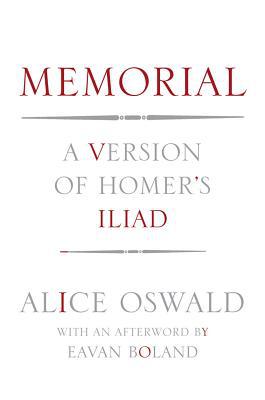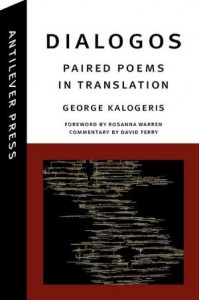Poetry Review: A “Memorial” Written in a Voice That Does Not Break
Alice Oswald’s Memorial begins with a list of 214 names, a bare, sorrowful cousin to the ship’s roll. If you know the old stories, you’ll begin to recognize some names and then start to look forward to others.
Memorial: A Version of Homer’s Iliad by Alice Oswald. W. W. Norton & Company, $24.95.
By Marcia Karp
Lists, like the limbs of great dancers, need not be endless in order to insinuate that they go on forever. Nor need they be complete to be comprehensive. The Iliad, full of lists—short ones, long ones, compact and diffuse ones—is even more full of life than what it gives in words; the implication in many of its many lists—this basic organizing technique—is that there is more that can’t be fitted in right now. More childhood deeds and more disagreements with a father. More who loved Helen. More widows’ tears. More cowards—Paris and Dolan couldn’t possibly be the only ones. More days—the poem is about a month or so in the tenth year of the war. More ways that men die than by a spear through the jaw, a spear through the nipple, a spear through the neck, nose, buttocks, and thigh, armor clanging upon a corpse, armor stolen, armor fought-for as the occasion of death. More children for Hecuba to mourn. More humiliations, but none so awful as Priam’s touching the knees, kissing the hands, of Achilles.
Early in the twentieth century, the Rev. Alfred J. Church, M.A., published The Iliad for Boys and Girls: Told from Homer in Simple Language. The “ages recommended for first reading” are 8-10, so you might expect Andromache’s bitterness to have been left out, along with the cruelty of the gods and the spears and the details of death and Priam’s begging. They haven’t been, but the quintessential list, the catalogue of the ships has been, for matters of space, I hope, not from a sense, which some readers still have, of a dull and an unimportant litany.
The poet himself prepares for the roll by calling on help from the Olympian Muses: they know all things (I quote from Stanley Lombardo’s fine 1997 translation) while humans hear only reports and know nothing.
The rank and file I could never name,
Not even if I had ten tongues, ten mouths,
A voice that never broke, and a bronze heart,
Unless the Olympian Muses, daughters
Of Zeus, called to my mind
All those who came under Ilion’s walls.
Reports are not only history and memory, but also fame. This is, after all, a poem that gives life. Remember what John Dryden wrote to his cousin, John Driden, MP for Huntington. His Honour’d Kinsman, whose help is freely extended to his neighbors and whose hunts betray his English manliness, must not mind that he is a man of action only:
Two of a house, few Ages can afford;
One to perform, another to record.
Praise-worthy Actions are by thee embrac’d;
And ’tis my Praise, to make thy Praises last.
What do we want? Immortality. When do we want it? Now, for the grave’s a hole that’s dark and drear; none there, I think, of fame do hear.
Ovid cuts out the middleman when he deals in futures. He takes it upon himself—at the end of his grand story of time, universe, and all things—to petition, first, that Julius be set as a flaming comet in the heavens, next for long life for Augustus, who should, once dead, be set even higher than his adoptive father. Then, debts paid, Ovid closes the book with one last metamorphosis: his, to
indelible, eternal, will remain.
And everywhere that Roman power has sway,
in all domains the Latins gain, my lines
will be on people’s lips; and through all time—
if poet’s prophecies are ever right—
my name and fame are sure: I shall have life.(Translation by Allen Mandelbaum, 1993.)
Turns out, Ovid was no slouch as a prophet, though he didn’t see the most inevitable changes, those of political power, and so didn’t ask, but received, a greater eternity than one depending from his ambivalent patron.
Jorge Luis Borges addresses a poet with a different fate than Ovid’s.
Between the smooth clay banks of Time the current’s
Surge hasn’t carried a single verse of yours
Back down to us: your name survives as a footnote
Salvaged from the numbered flow of years
By a dense appendix.
Borges offers compensation for the time’s neglect. He ends “To a Minor Poet of the Greek Anthology” by telling the ancient poet that, lacking the powers of great ones to see into things, he’ll never be a danger to, or be disappointed in, the world. The poem presupposes a fiction in which, though today’s poet won’t restore his predecessor’s name, Minor Poet is in a state to receive the consolation. And so, he has survived (but in silence). The translation is George Kalogeris’s from his just-published Dialogos: Paired Poems in Translation (Antilever Press, 2012), where Borges’s opening poem is coupled with Constantine Cavafy’s “The Trojans.” The echoing between the poems is a reminder by contrast of just how few traces of a people might survive, how few names, and how few verses. A reminder of how incredible it is that any names at all survive. (Who is Homer anyway?)
Because of the accident of the Iliad’s survival, Cavafy can, and does, take us into a known world. We know the greats, and because we know what happened there, we know what it means that the people of Troy are Cavafy’s pattern for all who are doomed to fail.
Outside the city walls, running for dearLife as the sweat pours down, though our legs feel frozen.
Already it’s time to start the lamentation.
And then, high up on the ancient parapets,
Priam and Hecuba weep, weeping for us.
Of all the items in Fame’s reports—running for dear life, a cousin’s deeds, a poet’s self-regard, a lost youth, a sickening death, and the tears of things—a name is what matters most.
Alice Oswald’s Memorial begins with a list of 214 names, a bare, sorrowful cousin to the ship’s roll. If you know the old stories, you’ll begin to recognize some names and then start to look forward to others.
Or, Alice Oswald’s Memorial begins on the cover and not with a recitation of dead men’s names (no one on the list makes it home alive) gathered from a handful of days at the end of a long war. Look: stone-gray letters in the square Roman capitals that have changed little since they were inscribed on antiquity’s monuments, letters whose curves and serifs have a softness time might have worked on stone; dignified devices that separate elements; and down the carved names, not Thomas Hardy’s rain-drop, but warriors’ blood, ploughs. The book is lovely and, from the start, the generosity shown by the publisher on sometimes nearly blank pages contributes to the sense of time-taking the short book calls forth.
The 214 names, in order of the deaths in the Iliad, take time to read. Memory might intrude. So, too, might a sense of obligation to try to get right these names that are now recited in language whose qualities of sound and stress are far removed in time from what those in the litany might recognize. The rest of the poem gives account of the deaths in their order, interspersed with epic similes.
Oswald uses no punctuation, save line breaks and uppercase letters where English calls for them and to start lines. Each dead solider is introduced in small caps. (Unfortunately, the stateliness Oswald creates by the typography is lost in the formatting available on the site. Think of this loss as Olympian encouragement to find the book.) On occasion the victor is named along with the vanquished. Oswald’s writing is characteristically precise and subdued, producing an effect of unsentimental empathy. Try to swallow as you read this:
The mistake of his father’s mistress
Felt the hot shock in his neck of Meges’ spear
Unswallowable sore throat of metal in his mouth
Right through his teeth
He died biting down on the spearhead
The similes are not in the same order as in Homer. Like his, they are echoes or preparations or comments or puzzling.
Of the eagle
Under whose beam
The shadow-swift hare can’t hide
Pressed flat to the floor
Of a leafy wood
That loitering eye looks once
And kills
This one follows a passage where six men are killed by Diomedes
With his eyes peeled down to their see-through stones
and precedes one where Pandarus
charged at Diomedes and a spear
Thrown by Diomedes pushed hard in by Athene
Hit him between the eyes
I hear, too, an echo from Auden’s “The Shield of Achilles” in the coming together of Homer, loitering, birds, and killing, or the attempt:
Loitered about that vacancy; a bird
Flew up to safety from his well-aimed stone:
The lengths of the death tales vary according to what is in Homer, sometimes being the least a soldier can expect.
PIDUTES
ARETAON
The flash of a spear
Woke them with a jolt
And
ANTILOCHUS
ELATUS
PHYLAKOS
MELANTHIUS
Antilochus figures in the book’s two mistaken deaths. He should be replaced in the list above by Ablerus, whom he killed. Twenty pages later, Antilochus is again mourned, though Poseidon kept Adamas’s deadly thrust from reaching its mark. Adamas, who had no divine protection from Meriones’s spear, should be restored. These are small matters for the next printing (this book should be around for a long time).
Homer’s scope of concern is not lost in Oswald’s concentrated version. War contains all of life, a small bit of it beautifully said here.
Mysteriously thickens it
As if a drip of lethargy
Falls into the bucket
And the woman stirring
Stops
This simile precedes the death of Sarpedon, the son Zeus had no power to save. It could have introduced any of the deaths, yet the domesticity works well with the image of the crumbled as linen young man who almost is revived by Sleep and Death.
The similes are repeated. There are two chances to read them because there are two ways to. The world of the poem is more fully realized by the double take of description and comparison.
War is everybody’s heartbreak, whether every somebody is named or not.
Stood there stunned by fear
[. . .]
His armour was useless it simply
Cried out and broke open oh
There stood ALCATHOUS and a spear
Knowing nothing of his wedding
Not knowing his feelings or his wife’s face
Or her doting parents or her incredible needlework
That spear went straight through his heart
And began to tick tick tick but not for love
Aeneas is the brother and son of those somebodies, but in this version, he will not be brought in and deflect from the memory of Alcathous. Oswald uses anonymity variously—withholding, above; by necessity, below. I can’t say why I find these instances so powerful. They rank with William Carlos Williams’s differently powerful “some doctor’s family, some Elsie—.”
Running at a man thinking kill kill
In years to come someone will find his helmet
Shaped like a real head
Someone is next a pivot from killed to killer, who each in his own way becomes no one.
Someone was there
And the next moment no one
One of the mourned is Pedasus, the horse whom Achilles has taken as war booty. His grave is a bitter reminder of his life.
with unquestioning eyes
Carried and served both sides
Now the earth is his owner
With few exceptions, every dead soldier is named first in the opening roll and last during his death. One effect of this is an equality of importance, regardless of the glory won in battle. The final death begins:
The poem ends with similes of great movement, strength, and finally of mystery.
Not all soldiers die in war. Those who don’t, grieve and rage for comrades and for the men, or boys, they were before battle. Jon Stallworthy’s War Poet (Warwick UK: Greville Press Pamphlets, 2009) is a powerful voice from within the trench and outside it.
Now, Coon, who doesn’t make it home, but lives just long enough to grieve and rage for his brother, killed before his eyes.
It gets into the cracks in the eyes
It lodges its lump in the throat
When a man sees his brother on the ground
He goes mad he comes running out of nowhere
Lashing without looking and that was how COON died
First he wounded Agamemnon
Then he grabbed his brother’s stiffened foot
And tried to drag him home shouting
Help for god’s sake this is Iphidamas
[. . .]
Throughout the poem, Oswald exploits what her unpunctuated lines can do. One virtue is the syntax of continual language whose flexibility has not been submerged by the formality of punctuation. Notice the movement from throat to When a man sees his brother and the equally well-shaped thought made as When a man . . . turns into He goes mad. This is the way speech works, this is the way Alice Oswald writes: rolling out a bolt of language that provides simultaneous perfect places for cutting and stitching, as
Help for god’s sake this is Iphidamas
No matter how this is heard, the poem resides here: this is Iphidamas. This is what we can give those we grieve for.
As for the fame of Memorial, it was published first in October 2011 by Faber and Faber. Within the month, it was on the shortlist for the T. S. Eliot Prize (the one awarded by the Poetry Book Society in the UK, not the other, from Truman State University in the States). Other of Oswald’s books have been shortlisted for the Prize, and her 2002 Dart won. This time, in December 2011, she withdrew her work out of concern that the new sponsor for the PBS had ethics she does not approve of. Like Ovid and others Jon Stallworthy writes of—
his nib must cut with chisel-blows
the lettering of his tomb.[“Shall these Bones Live?” The Apple Barrel, 1974]
—Alice Oswald’s name, not only her work, means something to her.
Written in a voice that does not break, this poem is really something to prize.
Tagged: Alice Oswald, Dialogos: Paired Poems in Translation, Homer, Iliad, Jon Stallworthy, Memorial, Poetry




“And ’tis my Praise, to make thy Praises last.”
The hope of every writer.